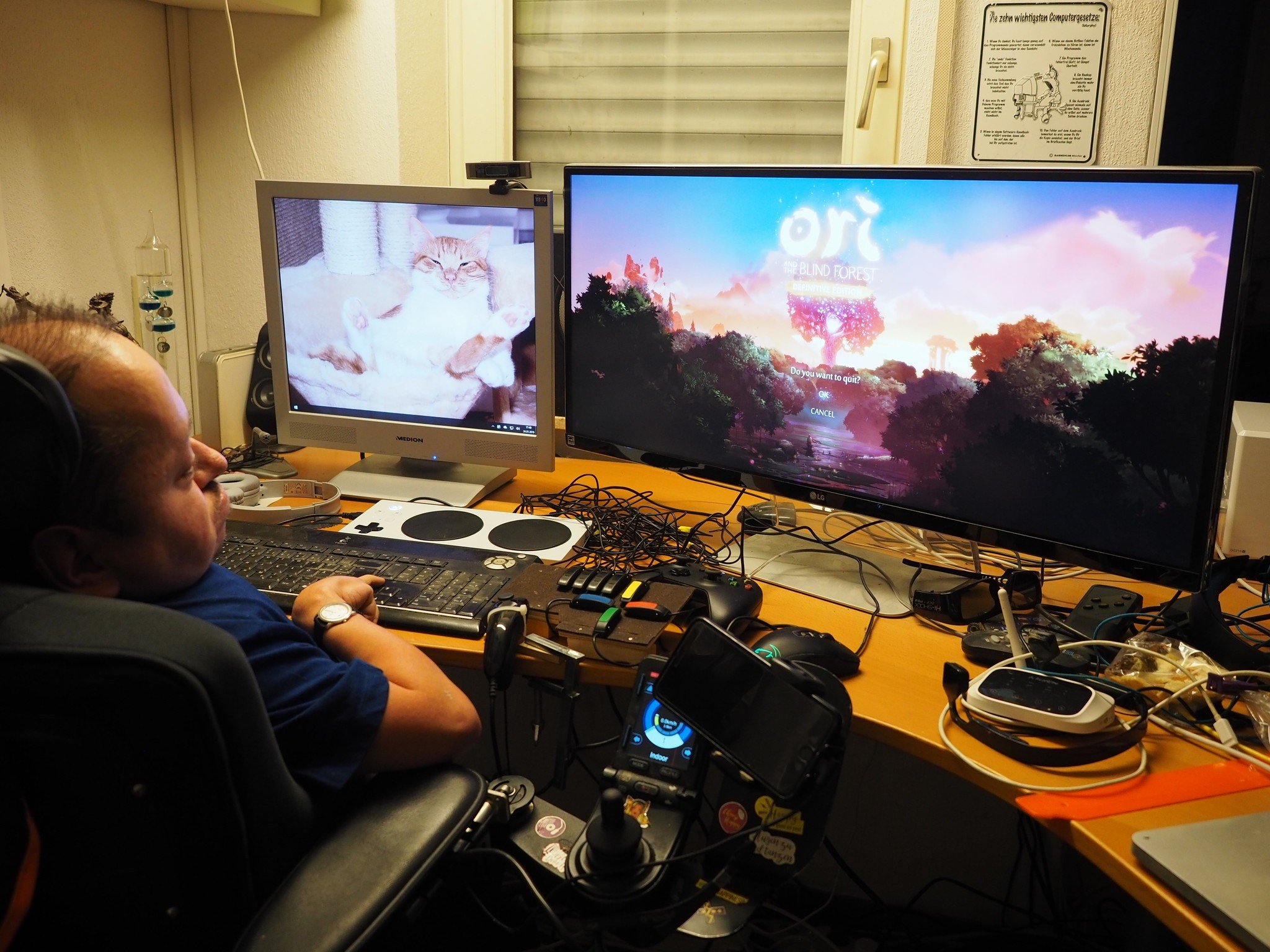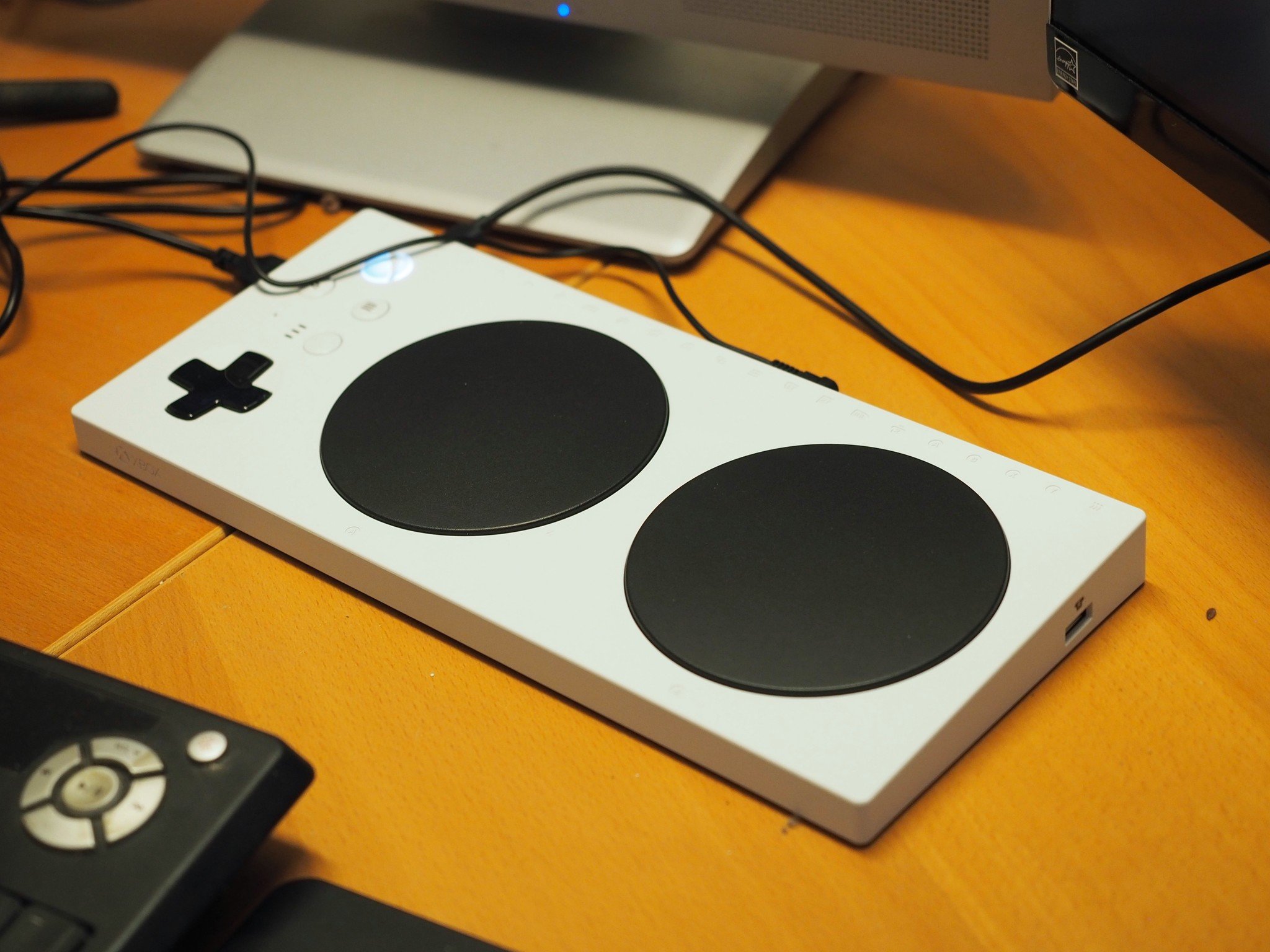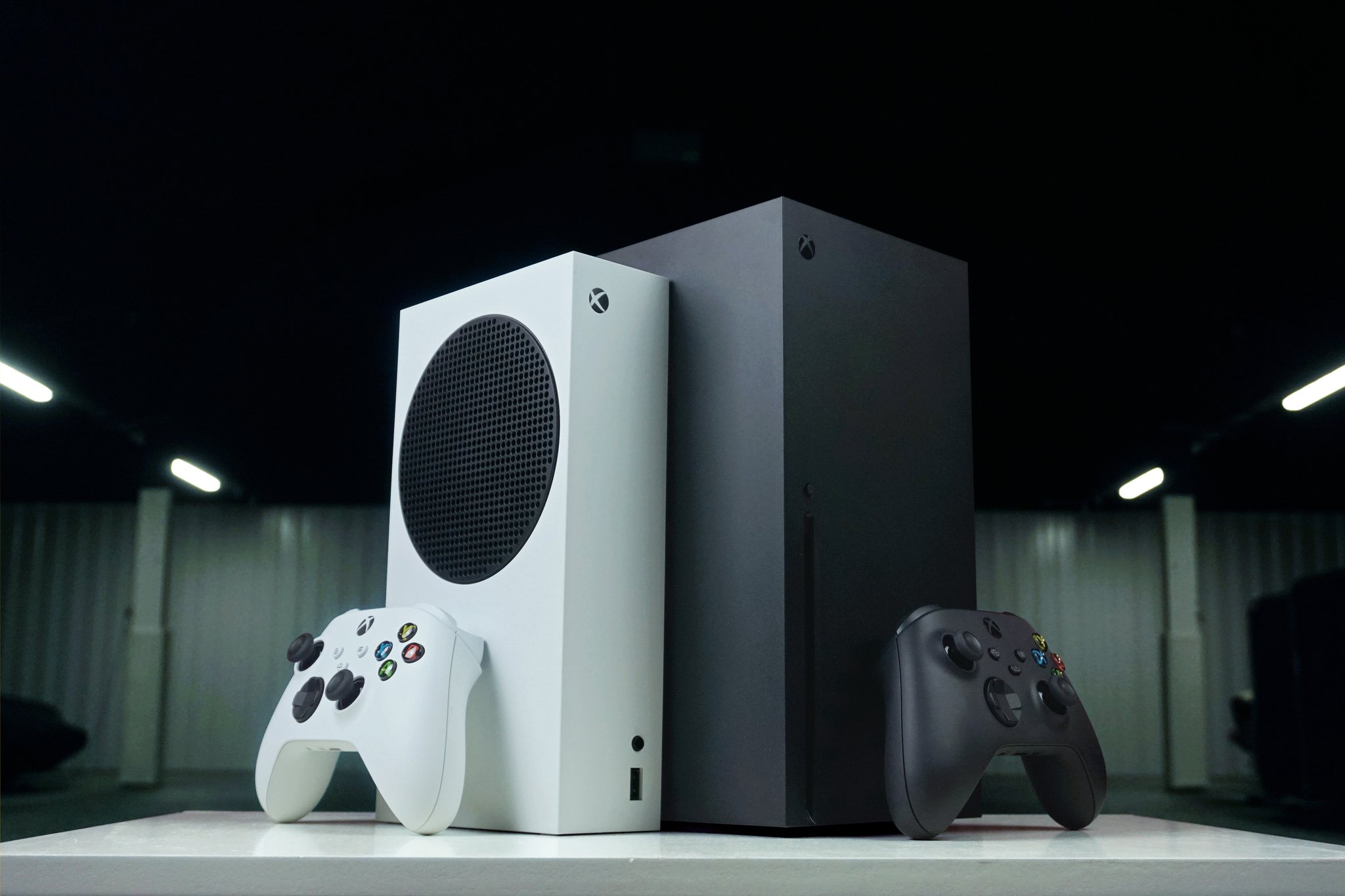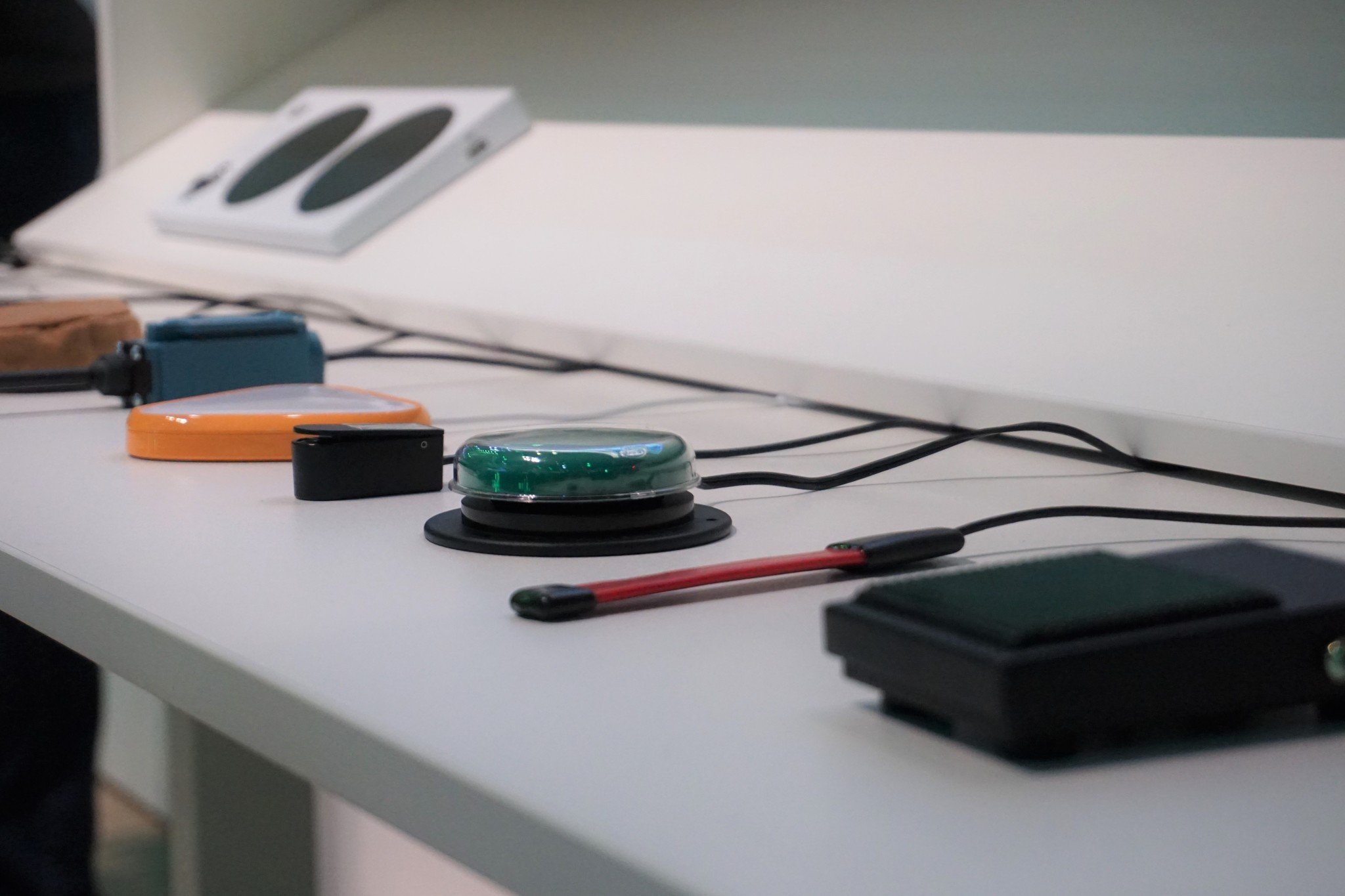 A custom Xbox Adaptive Controller built by Oliver Koerber.
A custom Xbox Adaptive Controller built by Oliver Koerber.
Microsoft's accessibility drive is yielding real-world results for individuals everywhere.
Microsoft has invested more than ever in its gaming business lately, with its purchase of ZeniMax/Bethesda, a huge staff increase, exclusive content for Xbox Game Pass, and much more. There's another area of investment in the Xbox division that is producing results of an entirely different nature, though: improving people's lives.
Microsoft's accessibility drive hit the spotlight with the advent of the Xbox Adaptive Controller, which allows gamers with disabilities to create custom solutions to fit their specific needs. Really, though, there's so much more to what Microsoft is doing in the space, and it goes all the way back to the Xbox 360, when Microsoft brought screen readers like Windows' Narrator, and later features like Xbox Copilot on Xbox One.
It doesn't really need explaining — Microsoft's leadership in this space is changing lives for the better, and other companies should sit up and take notice.
Changing lives
I previously wrote about how the Xbox Adaptive Controller helped my friend Oliver, who works around osteogenesis imperfecta to maintain an active gaming lifestyle. Of course, there's no simple catch-all solution for solving accessibility needs — as versatile as the Xbox Adaptive Controller is by itself, it requires a range of tools and features for a platform to be truly accessible, and there's still work to be done.
I was inspired to take another look at accessibility recently by this post on reddit, from u/duz_machines. He describes Xbox's Copilot feature, which allows you to separate controller features between two different gamepads in a single game. His sister has cerebral palsy, with impaired motor skills. As a result of Copilot, u/duz_machines' sister has enjoyed an improved quality of life, able to experience games that were previously completely inaccessible.
For those unfamiliar with copilot mode, basically all it does is allow two controllers to input as one controller. This enables me to take a lot of the burden from her, while allowing her to control what she can control. She's been able to play games previously unfathomable for years because of this one, small, almost hidden feature. What pushed me over the edge to actually write this was Resident Evil Village. It is now one of her favorite games of all time; she can't stop talking about it, and the only way she could've enjoyed it was Xbox. Nintendo and Sony don't offer a copilot mode equivalent.
Sony has begun improving its accessibility features gradually, adding narrator features and other things, but is still a fair ways behind the curve. Nintendo is arguably the worst, for multiple reasons. Nintendo's IP is Disney-like in their appeal to younger audiences, and there's nothing worse to me than imagining how Nintendo makes youngsters with disabilities near completely excluded, owing to its general apathy towards these sorts of features.
The importance of inclusion
One of my younger relatives is on the autistic spectrum. He barely spoke until he was 8 years old, and engaging him was generally incredibly difficult. One way we could communicate was through gaming. Although the Super Nintendo had no Copilot mode, I remember draping a blanket over the TV while playing Star Fox, handing him a controller, and pretending to co-pilot the Arwings through space. Those early experiences helped him eventually get into gaming for himself, forming a cornerstone of his relaxation and recreation time. His accessibility needs are not as mechanically complicated as they relate to gaming, though.
I recently caught up with SightlessKombat, who is a gaming accessibility consultant with blindness. SightlessKombat is a max-ranked Killer Instinct player on Xbox, and has worked with Microsoft and others to enhance games and platforms for the disabled.
SightlessKombat explained to me how Xbox's Copilot changed the game for him, providing access to games that were previously completely out of reach, "Going from being squashed together on the same couch and uncomfortably sharing a controller to me and a sighted player having our own full set of controls at our fingertips was so freeing." SightlessKombat has now successfully completed games like Titanfall 2, DOOM 2016, Wolfenstein: The New Order, and Star Wars Jedi: Fallen Order, ultimately providing returns for developers thanks to this platform-level feature. "I would love to see this kind of input setup become standard across all platforms as, not only does it help gamers with disabilities, but also families who want to bond over a game."
Check @SightlessKombat obliterating me in #KillerInstinct 😫 #XboxShare pic.twitter.com/RZ2pWXLQ9e
— Jez (@JezCorden) June 7, 2021
Beyond Copilot, SightlessKombat also benefits from thoughtful game design. Killer Instinct's sound design and gameplay features allow SightlessKombat to play Killer Instinct completely independently, able to compete on equal footing in competitive play. We went a few rounds in Killer Instinct a few weeks ago, where he summarily destroyed me. "Killer Instinct's audio design allows you to tell, a vast majority of the time, precisely what's going on. It lets you know when to end your combos for optimum damage thanks to the HUD Meter Volume Slider, an accessibility feature that plays audio cues based on your combo gage, introduced to assist gamers without sight."
I also caught up with Cerebral Paul who navigates cerebral palsy to game. Paul uses the platform-level button remapping to assist his motor skills, alongside the more configurable Xbox Elite Series 2 controller. Paul noted to me how Microsoft's efforts in the space have allowed him to feel more like a participant in the ecosystem, taking him off the sidelines, "Only within the last 5 years have we seen a greater shift and companies like Microsoft saying, 'Hey, here's a mostly untapped segment of the population that we should be helping to get involved, to become a part of the world, and not just spectators of it.' That alone is important. People want to feel like they matter — like they count — that's where inclusion comes in. It makes us feel like we're the same."
Next steps
As gaming moves increasingly away from the obscure hobby our parents don't understand to being wholly mainstream, every company has a social responsibility to take inclusion more seriously. The argument that it's too "expensive" doesn't even hold water — there are millions of people out there with disabilities, who are ready and willing to spend money if these companies will just allow them to join in. Once the features are in place, they will pay for themselves over time, bringing games to new audiences.
Microsoft may have ignited the fire, but there's still a lot more work to do. Microsoft can do a lot of stuff at the platform level, but it also requires involvement from developers to take an interest in adding relatively simple features to address accessibility. SightlessKombat emphasized how important it is to get feedback on accessibility early on in a game's development, "Hire consultants as early as possible to be a part of development, design, iteration, feedback, playtesting, etc. That's not just something for Microsoft to do, but all platform devs."
Adding accessibility features and modes should become a standard part of game development, as granted as resolution sliders or difficulty levels. Microsoft is well positioned to help drive inclusion with their vast wealth and profits, and thankfully, continues to invest heavily in platform-level accessibility features. It's about elevating the quality of life of millions who have been excluded from popular activities arbitrarily. While there might be a vague argument as pertains to smaller teams and independent developers with regards to hiring consultants, there's no excuse whatsoever for the bigger players. When you read about Activision CEOs being paid over 150 million dollars per year, it reduces the argument of cost practically to zero.
Microsoft may have ignited the fire, but there's still a lot more work to do.
Cerebral Paul emphasized the frustratingly slow pace of improvements, "It is only within the last 50 years or so that societal views have started to shift. As far as we've come in many aspects, the entertainment industry and the gaming industry, in particular, seem to be among the slowest to normalize and include those with disabilities."
There are millions of kids out there who can't experience the games being actively pushed as the new "cool thing" because of publisher apathy. There are millions who live in isolation, who have an opportunity to make human connections through network play. There are millions of people who actively want to participate in the ecosystem, and ultimately give money to game devs, who can't — simply because they can't access the game and lack the necessary tools. For every youngster who can't participate in the world's favorite pastime, the industry has a responsibility to step up its game. There's some amazing work being done by charities like AbleGamers and SpecialEffect, but it's more important than ever that those with big platforms, such as Xbox, keep trying to change attitudes.




No comments: